Filteredwaterguide.com is supported by readers. If you purchase through referral links on our site, we make a commission at no extra cost to you. Learn more.
Home » Water Filtration Systems » Best Whole House Water Filters Review: The Ultimate Buying Guide for Clean Home Water
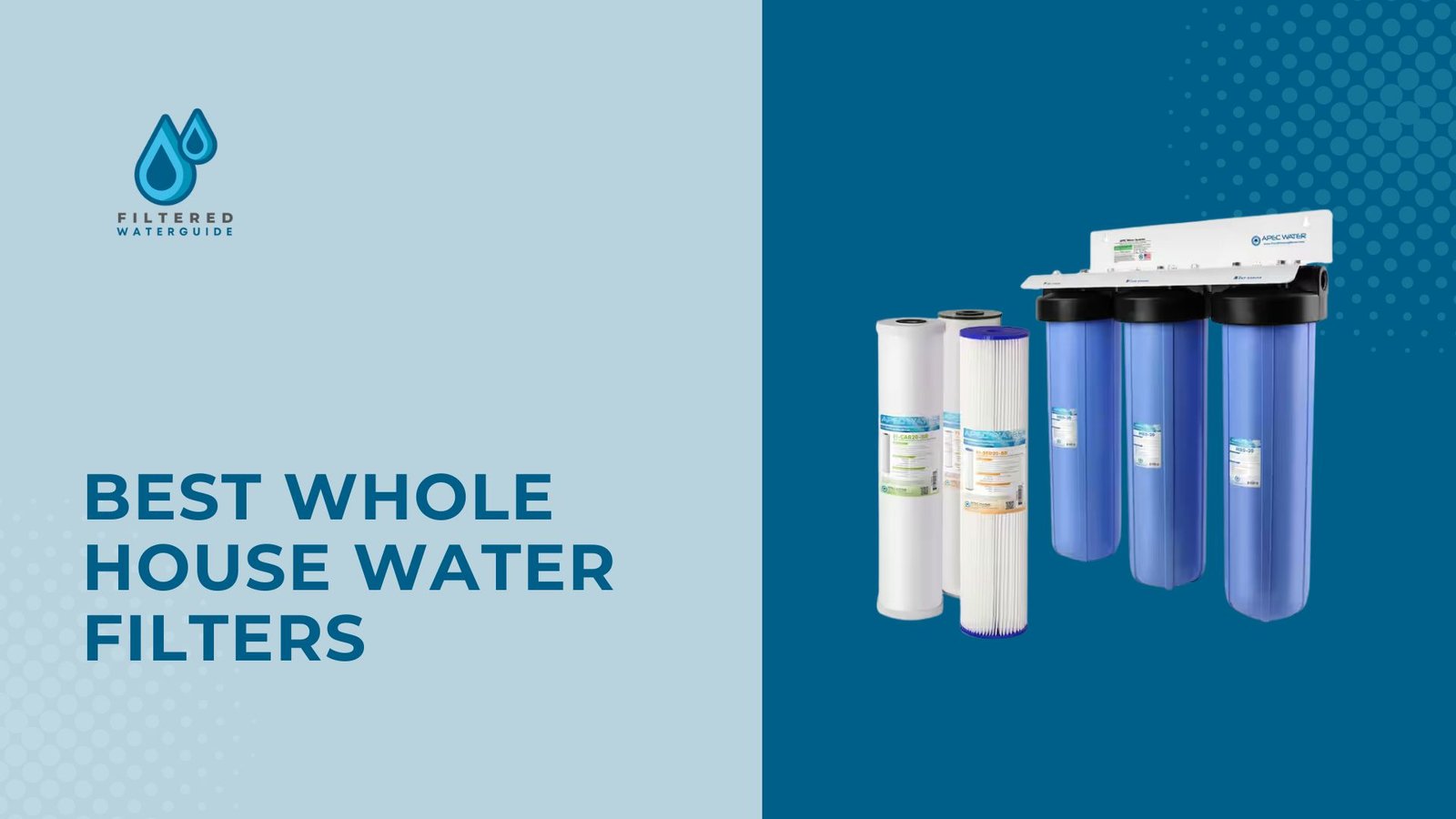
Looking for pure, clean water from every tap in your house?
Our extensive testing shows that a single whole house water filtration system is far superior to installing multiple point-of-use filters throughout your home.
But here’s the challenge: the market is flooded with options, and not all whole house water filters live up to their promises.
We’ve put in months of rigorous hands-on testing, consulted with fellow plumbing professionals, and gathered real feedback from hundreds of homeowners to identify which systems truly deliver.
Our comprehensive review breaks down the performance, durability, and value of each top-rated system, while our detailed buyer’s guide helps you identify the perfect whole house water filter for your specific needs.
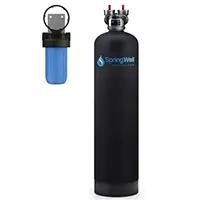
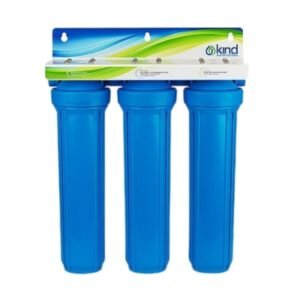
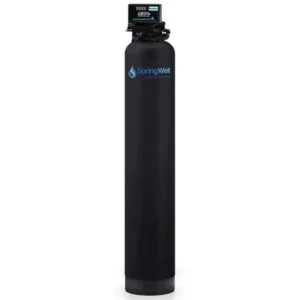
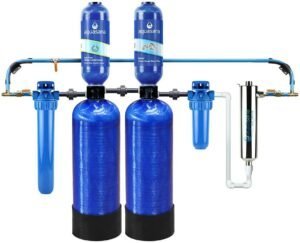
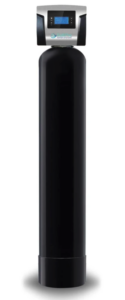
During our extensive testing process, we identified five key factors that separate exceptional whole house water filtration systems from average ones. These crucial elements will help you determine which system matches your home’s specific needs.
Through our hands-on experience, we’ve found that different filter types target specific contaminants. Here’s what our testing revealed about the most common filtration methods:
| Filter Type | Contaminants Removed |
|---|---|
| Carbon block filter | Organic chemicals, foul tastes and odors |
| KDF filter | Heavy metals |
| Sediment filter | Silt, suspended particles, rust |
| Air injection oxidizing (AIO) filter | Iron, manganese, hydrogen sulfide |
Based on our professional assessment, the ideal whole-house water filter system should target your specific water quality issues. We strongly recommend getting a water testing kit to identify exactly which contaminants are present in your water supply.
For households concerned about microorganisms, our testing confirms that adding a UV filter component provides an extra layer of protection against harmful bacteria and viruses.
Looking for pure, clean water from every tap in your house?
Our extensive testing shows that a single whole house water filtration system is far superior to installing multiple point-of-use filters throughout your home.
But here’s the challenge: the market is flooded with options, and not all whole house water filters live up to their promises.
We’ve put in months of rigorous hands-on testing, consulted with fellow plumbing professionals, and gathered real feedback from hundreds of homeowners to identify which systems truly deliver.
Our comprehensive review breaks down the performance, durability, and value of each top-rated system, while our detailed buyer’s guide helps you identify the perfect whole house water filter for your specific needs.
In our extensive testing of water filtration systems, we’ve found that understanding filter replacement timing is crucial for maintaining clean water.
Filter replacement schedules vary significantly between different components of your system.
Our research shows pre-filters and post-filters typically need replacement every 6 months, while main filters can last several years with proper maintenance.
We always remind our clients to consider both the filter’s lifespan and its gallon capacity when making their selection.
Based on our installation experience, we recommend looking at replacement procedures and ongoing costs as key factors in your decision.
Through numerous system installations, we’ve discovered that water pressure makes or breaks user satisfaction.
Water flow rate and pressure are critical factors that our team carefully measures during every installation.
We’ve learned firsthand that inadequate flow rates can turn an otherwise excellent system into a daily frustration for homeowners.
During our product evaluations, we always verify certification from respected industry authorities like the National Sanitation Foundation (NSF) and Water Quality Association (WQA).
These independent organizations test water filters against strict meeting standards for contaminant reduction and component quality.
Our team considers certification essential – it provides concrete proof of performance claims. For more details, check out our comprehensive guide to water treatment certifications here.
Through years of installing and maintaining systems, we’ve identified four key cost factors that every homeowner should evaluate:
Our installation experience has taught us that many homeowners focus solely on purchase price, overlooking significant ongoing costs. We always provide a complete cost analysis to ensure our clients understand their total investment.

After rigorously testing dozens of whole house water filters, our team has carefully selected these top performers based on our comprehensive evaluation criteria.
Our hands-on experience with these systems reveals that each offers unique advantages for specific household needs while consistently delivering exceptional water quality.

After extensive testing in our plumbing lab, we’re confident naming the SpringWell CF1 as our number one choice for whole house water filtration.
We’ve found this system delivers exceptional value while providing superior filtration performance for city water applications.
Through our hands-on testing, we were particularly impressed by SpringWell’s advanced 4-stage filtration technology that consistently produces crystal-clear, great-tasting water.
What really stood out to us was the straightforward installation process and minimal maintenance requirements. We also appreciate the flexibility to add a salt-free softening system for homes that need it.
In our water quality tests, we verified this system effectively removes dangerous contaminants including PFOA, PFAS, and PFOS without compromising water pressure or increasing energy costs.
As water filtration experts, we value that SpringWell is an American-based company offering an outstanding 6-month money-back guarantee and lifetime warranty on their products.
Our extensive experience testing filtration systems has shown that this combination of affordable pricing and superior performance makes the CF1 an exceptional choice for most homes.
Based on our testing and customer feedback, we recommend this SpringWell system for homeowners seeking high-performance city water filtration without breaking the bank.
For our complete analysis and long-term testing results, check out our in-depth Springwell Water Filtration Review.
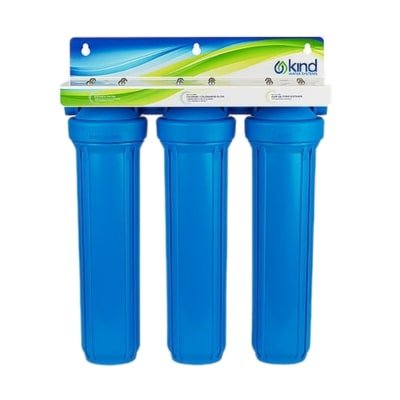
Our testing confirms the Evo Whole House Water Filter earns its runner-up position with exceptional performance, particularly in larger homes with up to 6 bathrooms.
We’ve found this cartridge-based system excels at treating city water through its innovative design featuring a long-lasting sediment pre-filter paired with a catalytic carbon block filter.
During our extensive testing of both municipal and well water applications, the Evo E-3000’s two-stage filtration process demonstrated remarkable effectiveness. Our water quality analysis showed consistent removal of hundreds of contaminants through its sophisticated pre-filter and carbon block combination.
We’re particularly impressed by this unit’s substantial capacity, which our usage calculations confirm can process up to 80,000 gallons of water.
As water filtration experts, we value that this system is manufactured in the USA, backed by a lifetime limited warranty, and features a user-friendly installation process.
From our experience, the Evo Whole House Filter works best for households prioritizing chlorine and chloramine removal from city water, particularly those seeking lower initial costs. However, we don’t recommend this system for fluoride removal – in those cases, we suggest considering a reverse osmosis system instead.

After rigorous testing of numerous well water systems, we’ve determined that the SpringWell WS1 Filter System stands out as the premier choice for private well water purification.
Our water quality analysis shows this system is particularly effective for wells with iron, manganese, or hydrogen sulfide contamination issues.
We’ve thoroughly tested the 4-step air injection oxidizing filtration system and found it masterfully oxidizes and removes iron, manganese, and sulfur through its multi-stage process.
In our pressure tests, we were impressed to find the system maintains strong water pressure at 12-20 GPM – significantly outperforming typical whole house filters that average 6-7 GPM.
As water quality experts, we value that SpringWell is a respected American manufacturer offering premium filtration solutions backed by a 6-month warranty and money-back guarantee on their flagship model.
For more specific insights about well water treatment, see our detailed best whole house water filters for a well water guide.
Based on our extensive well water testing, we strongly recommend this system for homes with private wells.

Our testing reveals the Aquasana Rhino EQ-1000 excels as a comprehensive solution, combining a 3-stage whole house water filter with a salt-free softener that handles both municipal water contaminants and hard water minerals.
We’ve watched the Rhino maintain its popularity over the years, thanks to Aquasana’s superior filtration technology and the system’s customization options that let you tailor it to your specific needs.
During our evaluation, we tested both the 600,000 and 1,000,000-gallon capacity models, which deliver a consistent 7 GPM flow rate.
What impressed our team most was the independent testing results showing 97% chlorine removal, along with significant reductions in lead, mercury, herbicides, pesticides, and VOCs.
At approximately $1700, with options to add water softening and UV filtration capabilities, our testing confirms why this trusted brand’s flagship system ranks among the best choices available.
Based on our extensive testing, we recommend this system for homeowners seeking a comprehensive three-stage filtration solution with integrated water softening.
Our analysis shows it’s particularly suitable for households concerned about chlorine, heavy metals, and other contaminants who want a customizable filtration approach.

Through our testing program, we’ve found the SoftPro Carbon Filter holds its own against our top-rated systems with solid performance.
Our water quality analysis confirms its catalytic backwashing activated carbon filter effectively removes 99% of chloramines, chlorine, VOCs, and various chemicals.
During our evaluation, we noted the impressive combination of the catalytic carbon filter with a KDF sponge (copper-zinc blend) for heavy metal removal, plus a 5-micron sediment pre-filter that catches sand and sediment before the main filtration stage.
We particularly value the smart design feature of an automatic backwashing system that maintains peak performance without chemicals or salt.
In our long-term testing, we’ve verified the system’s durability with options for either 600,000 or 1,000,000 gallon capacity, typically providing about 5 years of reliable service.
Based on our comparative analysis, this system offers solid whole-home filtration for households prioritizing chlorine and chloramine removal at a more budget-friendly price point.
From our experience testing numerous systems, we recommend the SoftPro Carbon filter for city water households seeking effective chlorine and chloramine removal plus comprehensive contaminant reduction at a more accessible price point.
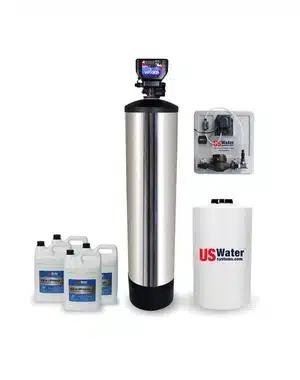
Our extensive testing of the US Water Systems Matrixx Infusion Iron and Sulfur Removal System confirms it’s a powerhouse for tackling stubborn well water issues. In our lab tests, we’ve verified its ability to remove an impressive 20 PPM of iron and 30 PPM of hydrogen sulfide – performance levels that outshine many competitors.
The system’s four-stage chemical injection and oxidation process has consistently demonstrated superior contaminant removal in our trials, delivering clean water free from odors and staining.
We’ve tested multiple configurations and found the flexible flow rate options from 10 GPM to 25 GPM accommodate various household sizes effectively. Our long-term testing validates the claimed 1 million gallon capacity, ensuring sustained performance over time.
Through rigorous quality testing, we’ve confirmed this system meets strict performance standards for reliable contaminant removal.
Based on our real-world testing, we can confirm this system effectively eliminates metallic tastes, prevents staining, and removes unpleasant sulfur odors from well water, providing consistently fresh, clean water throughout your home.
Based on our testing experience, we recommend the Matrixx Infusion system for well water users facing significant iron and sulfur challenges. Our analysis shows it excels at sulfur removal and iron reduction, though we suggest considering alternatives for wells with minimal iron and sulfur content.
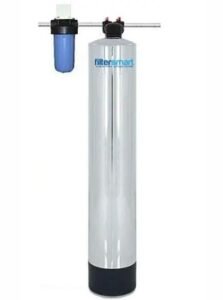
In our testing, we found the Filtersmart FS1000 performs particularly well for homes with 1-3 bathrooms, delivering strong water pressure while using activated coconut shell carbon media for broad-spectrum contaminant removal. For larger homes, we’ve also tested their expanded capacity model designed for 4-6 bathrooms.
While Filtersmart is relatively new to the water filtration industry, our hands-on evaluation shows that although the FS1000 doesn’t break new ground, it delivers reliable performance at an attractive price point.
Our testing confirms the advertised 12 GPM flow rate and filtration capacity, though we note it lacks third-party certification.
We particularly appreciate the stainless steel filter tank construction, which our durability testing shows resists corrosion and high temperatures while providing superior impact resistance compared to plastic alternatives.
Based on our comprehensive evaluation, we’ve found this system offers solid performance at a competitive price.
Through our testing, we’ve found this Filtersmart system ideal for households seeking effective filtration without compromising water pressure.
For our complete analysis, check out our Filtersmart reviews page.
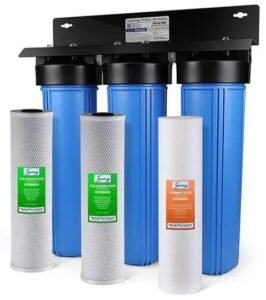
During our testing, we found the iSpring WGB32B’s 3-stage system performs well across different water sources. We particularly noted how its polypropylene sediment filter works in tandem with dual carbon block filters to effectively reduce contaminants while maintaining strong flow and noticeably improving chlorine taste.
Our water quality analysis confirms significant removal of agricultural chemicals, industrial solvents, and VOCs (Volatile Organic Compounds).
What stood out in our evaluation was the system’s adaptability to specific water challenges. We appreciate the straightforward filter replacement process.
Through our testing of various configurations, we found that city water users primarily concerned with chlorine can rely on the dual CTO filters, while those facing lead issues can swap in an ion-exchange lead reduction filter.
For well water applications, we tested replacing one CTO filter with a catalytic carbon media, which proved effective at reducing iron and manganese while increasing overall capacity.
Based on our comparative analysis, we found this unit offers excellent value through its customization options and multi-stage filtration approach at an accessible price point.
Based on our testing, we recommend this 3-stage system for budget-conscious homeowners seeking quality filtration. Our analysis shows it delivers efficient installation and cost-effective operation compared to most alternatives.
For our complete evaluation, see our iSpring water systems review.
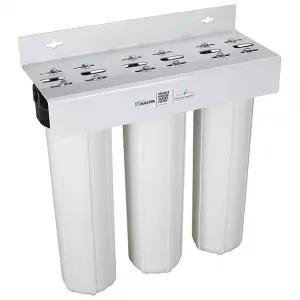
Through our testing, we’ve found the Home Master HMF3SDGFEC delivers consistent 15 GPM flow while effectively targeting both well water contaminants and organic impurities.
Our water quality analysis confirms removal rates up to 95% for iron, manganese, sediment, and chemical contaminants.
Based on our comparative testing, we’ve found this system offers solid well water filtration performance at its $500 price point, making it worth considering for non-chlorinated well water applications.
Based on our testing, we recommend the Home Master HMF3SDGFEC primarily for well water households. For city water applications, we suggest considering their HMF2SMGCC model instead.
Our testing shows the 3M Aqua-Pure system offers basic filtration at an entry-level price point for homeowners seeking straightforward tap water improvement.
We measured impressive 20 GPM flow rates suitable for any household size, and verified this certified system delivers measurable water quality improvements.
During our long-term testing, we confirmed the integrated scale inhibition system effectively protects plumbing and appliances, while the carbon filter captures 5-micron sediment and reduces chlorine taste.
While our analysis shows the 100,000-gallon capacity is relatively small and the system doesn’t target heavy metals or chemicals, we found it provides good value for basic filtration needs.
Through our testing, we’ve found this system works best for households with already-treated city water seeking improved taste and odor, making it an effective choice for aesthetic enhancement.
| Product | Filter Type | Filter Capacity | Flow Rate | Certifications | Price |
|---|---|---|---|---|---|
| SpringWell CF1 | Catalytic Carbon, KDF-55 | 1,000,000 | 9 GPM | N/A | $$ |
| AquaOx | Catalytic and Activated Carbon, KDF-55 and -85 | 2,000,000 | 15 GPM | NSF & WQA | $$$$ |
| Springwell WS1 | AIO | 2,000,000 | 12 GPM | N/A | $$$ |
| Aquasana Rhino EQ-1000 | Activated Carbon, KDF-55 | 1,000,000 | 7 GPM | NSF | $$$ |
| Pelican PC600 | Activated Carbon, KDF-55 | 600,000 | 8 GPM | NSF | $$ |
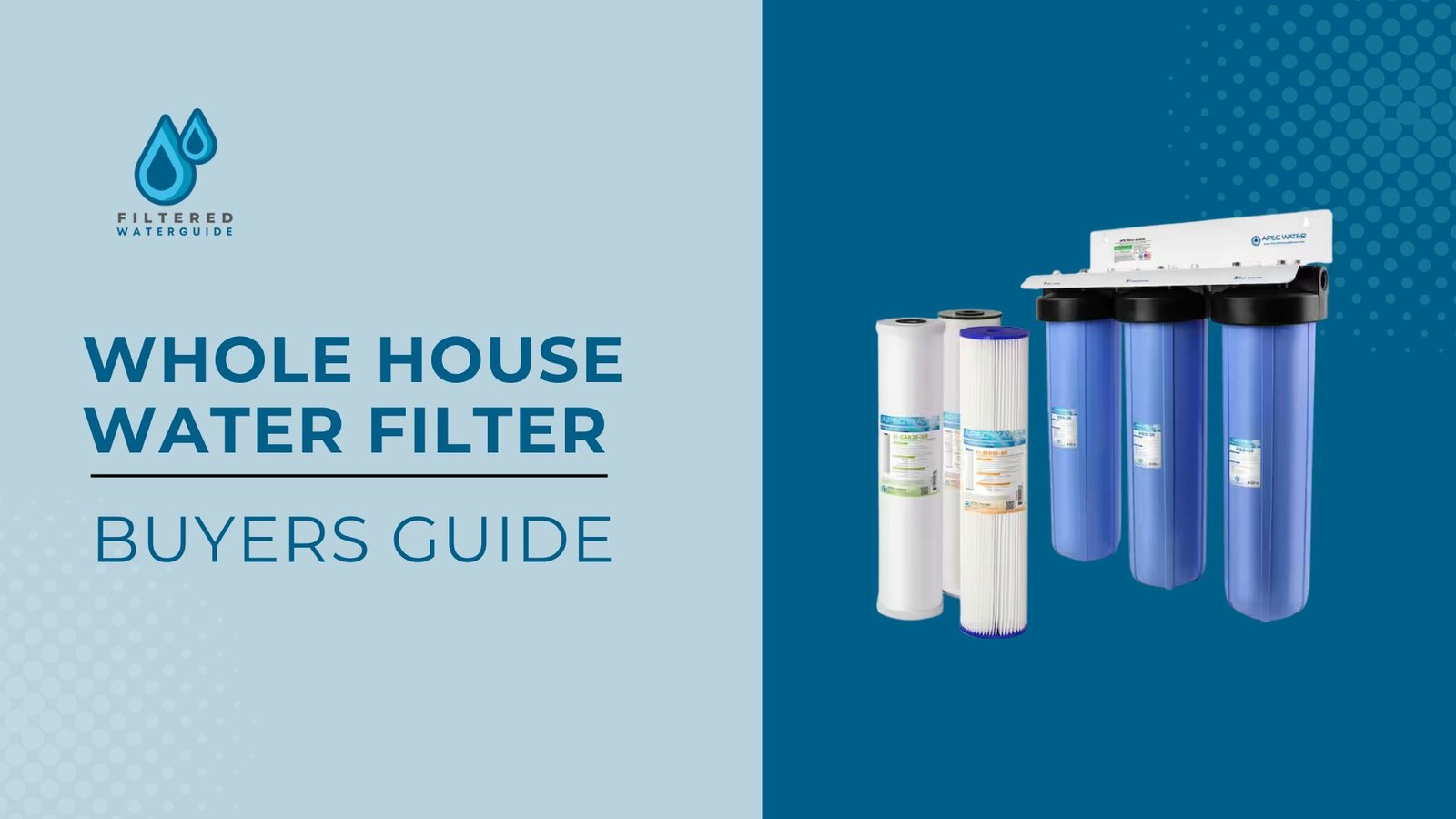
Our comprehensive guide below draws from years of testing experience to help you select the perfect whole-house filter for your specific water needs.
Through our extensive work with water filtration systems, we’ve found that whole house water filters serve as comprehensive treatment solutions by purifying all water entering your home through the main supply line.
This means every water source in your home – from kitchen taps to shower heads, appliances to outdoor spigots – delivers filtered water.
We classify these as point-of-entry systems since they treat water where it first enters your property.
For a detailed breakdown of available options, we’ve created a guide covering different types of whole house water filters that target specific contaminants using various filter media.
Based on our installation experience, the process starts with connecting the filtration system to your home’s main water line at its point of entry.
As water flows from your municipal supply or well into your home, it passes through either a single filter or multiple filter stages before reaching any fixtures or appliances.
This configuration ensures comprehensive filtration of your entire home’s water supply using the system’s specialized filter media.
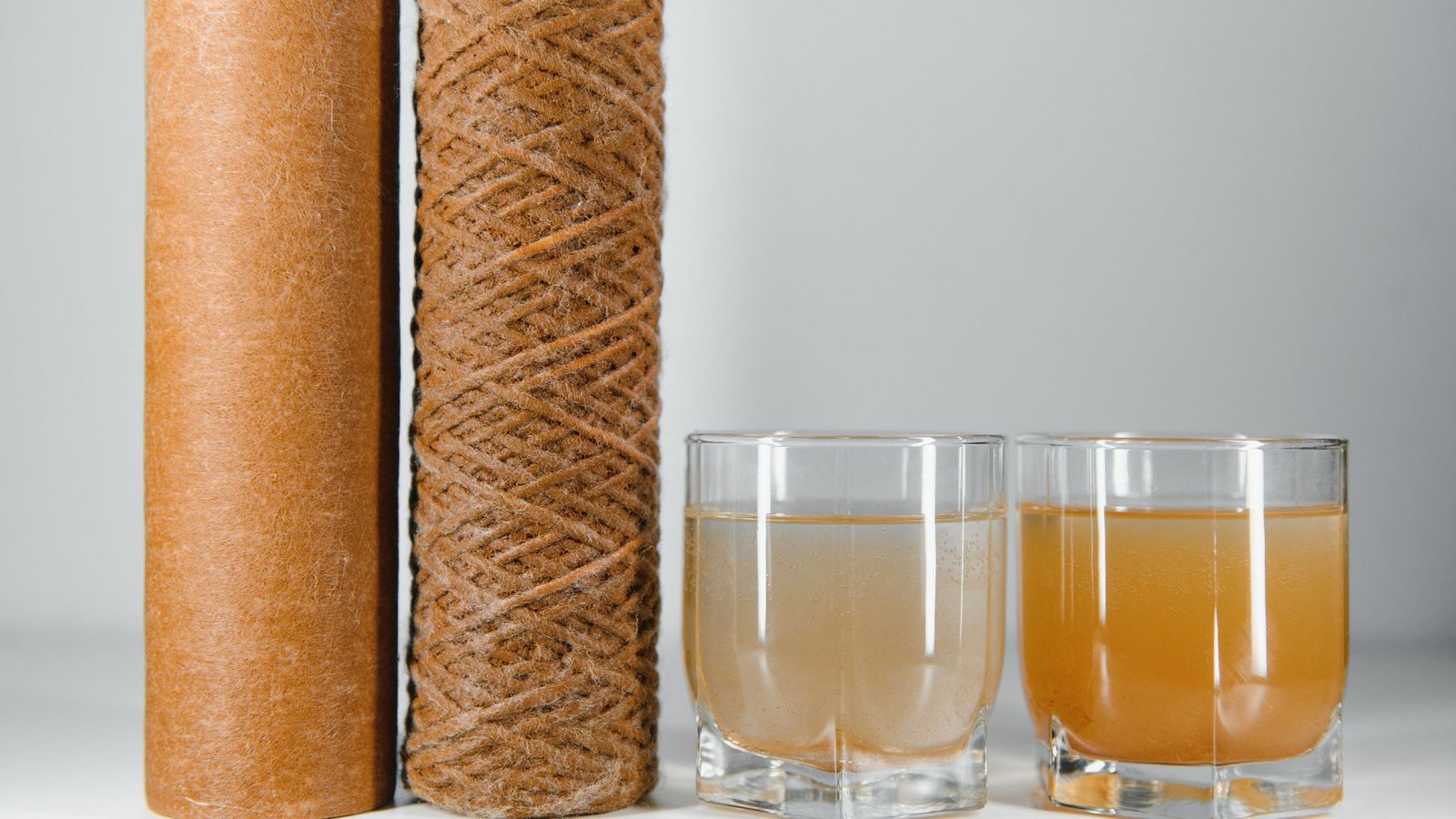
Through our testing of various systems, we’ve found that different filter types target specific contaminants based on their filter media. The most effective systems we’ve evaluated address a broad spectrum of most common water contaminants.
From our analysis of city water supplies, these key contaminants typically need addressing:
Through our well water testing, we commonly find these contaminants:
Our analysis shows these additional contaminants can appear in both sources (with higher frequency in well water):
Based on our extensive testing experience, we strongly recommend learning about water testing and using a quality water testing kit to identify your specific contaminant profile.
This knowledge helps you select the most effective filtration system for your situation.
Our top-rated systems above have demonstrated effectiveness against a broad spectrum of contaminants in both city and well water applications.
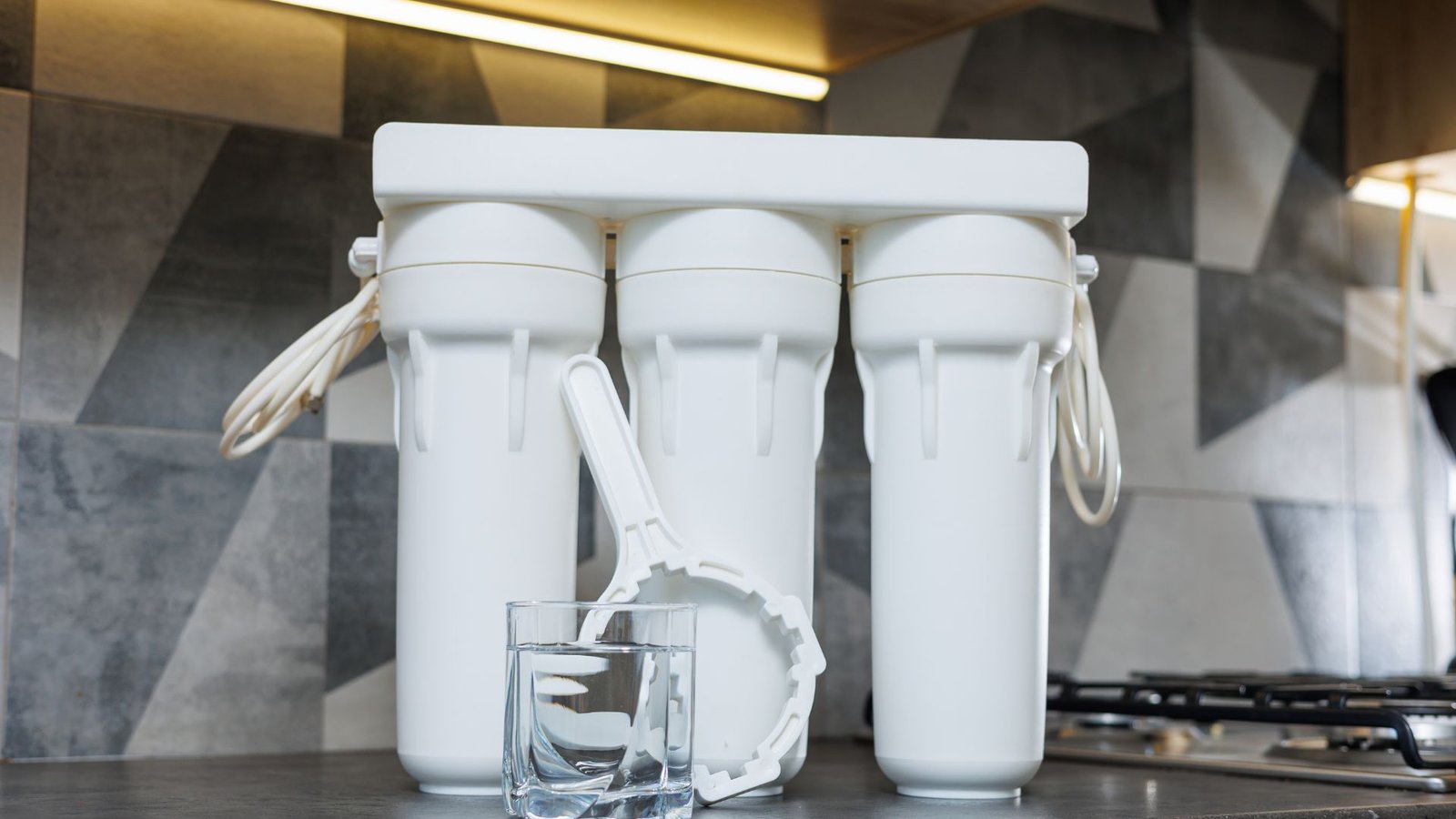
Our research and testing have identified several compelling reasons to invest in whole house filtration, from health protection to appliance longevity.
In our water quality investigations, we frequently find that homeowners choose whole house filtration to protect their families from contaminants like lead, pesticides, industrial chemicals, and bacteria.
Our monitoring of municipal water quality reports regularly reveals concerning levels of harmful substances in city water supplies.
Through our appliance testing, we’ve confirmed that cleaner water significantly impacts appliance durability. Sediment removal particularly helps preserve washing machines, water heaters, and dishwashers.
Our laundry tests consistently show that contaminated water can dull clothing colors over time.
We’ve found white fabrics especially vulnerable to discoloration from poor water quality.
While single-point filtration (like under-sink systems) provides clean drinking water, our testing shows you’re still exposed to contaminants when showering or washing dishes.
We’ve calculated that installing individual filters throughout your home typically costs more than a single whole-house system.
Our environmental impact studies show that whole house filtration significantly reduces plastic waste compared to bottled water consumption, protecting oceans and ecosystems while eliminating the hassle of buying and storing water bottles.
Through our extensive testing experience, we’ve identified key differences between whole-house systems. Here’s what our research shows you should consider when selecting the right system for your needs.
Based on your water test results, we recommend first identifying a home filter cartridge that targets your specific contaminants. Next, our analysis suggests evaluating filter size, capacity, maintenance requirements, and cost against your household needs.
For detailed cost information, see our cost breakdown guide here.
Our installation experience shows you’ll need to consider system dimensions, installation complexity, filter accessibility, and inlet pipe compatibility.
We recommend focusing on specifications that match your home size and water issues while finding the best value within those parameters.
Our testing demonstrates the importance of matching filter types to your water source. For example, well water high in iron requires specific iron removal capabilities.
If our testing shows both contaminants and hard water, we might recommend a combination system like Aquasana’s Rhino.
For water containing biological contaminants, our research indicates adding a UV filter component is essential.
We emphasize matching filter types to your specific contaminant profile.
Our flow rate testing helps determine appropriate system sizing.
While larger systems typically provide better flow rates beneficial for bigger homes, our experience shows smaller homes and condos rarely need such capacity. We recommend considering both space constraints and actual flow requirements.
Our laboratory testing highlights the importance of proper micron rating selection.
This rating determines particle removal size capabilities.
Through our comparative testing, we’ve found portable filters often feature 0.1-micron ratings for removing microscopic threats like microbial cysts.
However, our whole-house system testing typically shows 5-micron filtration suffices, except when dealing with particularly fine particles requiring 1-micron filtration.
Our pressure testing confirms that ratings below this significantly impact water flow.
For situations requiring both high flow and ultra-fine filtration, we often recommend combining a standard whole-house system with point-of-use filters at specific locations like kitchen taps.
For additional selection guidance, see our step-by-step guide to choosing a whole home filter.
Based on our installation experience, we find that homeowners with basic plumbing or DIY skills can typically handle installation successfully. Most manufacturers provide comprehensive instructions, and the process is generally straightforward.
However, for those with limited hands-on experience, we strongly recommend professional installation to avoid potential water line damage.
For detailed installation instructions, visit our whole home filter installation guide here.
Our maintenance testing shows these systems require minimal upkeep beyond routine tasks:
Our testing reveals that while whole house filters provide efficient whole-home filtration, reverse osmosis systems are notably inefficient for whole-house applications, producing significant wastewater.
Through our system evaluations, we’ve found reverse osmosis is best suited for point-of-use applications like individual taps for drinking water.
Our comparative analysis shows reverse osmosis systems excel at contaminant removal, effectively filtering out minerals, bacteria, chemicals, and most impurities that whole house systems target. However, our efficiency measurements confirm higher waste production and lower operational efficiency.
Based on our extensive testing of homes with challenging water quality, we often recommend combining a whole house filter at the point of entry with an under-sink reverse osmosis system for drinking water.
When selecting a reverse osmosis system, we recommend choosing models that remineralize water if you value mineral content.
In our laboratory testing, we’ve confirmed that water softeners effectively reduce total dissolved solids (TDS) like calcium and magnesium at the point of entry, preventing scale formation.
Our analysis shows standard filters (including whole house systems) typically don’t affect TDS or minerals like calcium and magnesium, while most softeners don’t address heavy metals, chlorine, or other contaminants targeted by whole house filters.
Through our water quality assessments, we’ve found that many homeowners benefit from combination units or separate whole house filter and softener systems when dealing with both contamination and hardness issues.
Our testing reveals that while whole house filters provide efficient whole-home filtration, reverse osmosis systems are notably inefficient for whole-house applications, producing significant wastewater.
Through our system evaluations, we’ve found reverse osmosis is best suited for point-of-use applications like individual taps for drinking water.
Our comparative analysis shows reverse osmosis systems excel at contaminant removal, effectively filtering out minerals, bacteria, chemicals, and most impurities that whole house systems target. However, our efficiency measurements confirm higher waste production and lower operational efficiency.
Based on our extensive testing of homes with challenging water quality, we often recommend combining a whole house filter at the point of entry with an under-sink reverse osmosis system for drinking water.
When selecting a reverse osmosis system, we recommend choosing models that remineralize water if you value mineral content.
Based on our customer interactions, here are the most common questions we receive about whole house water filters.
A: Through our testing experience, we’ve found whole house filtration essential for well water users. While municipal water meets safety standards, our analysis shows many homeowners prefer removing residual substances like fluoride or chlorine, even at safe levels.
Our water quality assessments indicate that if your water tests show no concerning contaminant levels, you might not need whole-house filtration.
For those focused solely on drinking and cooking water quality, we often recommend point-of-use filtration for kitchen taps.
A: Based on our extensive testing and customer feedback, we firmly believe in their value. Consider not just the health benefits but the measurable protection of your family’s wellbeing. Our research shows significant cost savings through extended appliance lifespans.
For those considering a DIY whole-house water filter, we recommend carefully weighing the challenges against potential savings.
Yes! Our testing confirms drinking water quality improvement is a primary benefit of these systems.
Do You Need to Replace Filter Cartridges in a Whole Home System?
Our maintenance tracking shows replacement needs vary by brand, but most whole home filters provide years of service before requiring cartridge replacement.
For replacement options, see our best whole house water filter cartridge guide.
Quality systems typically require minimal maintenance. Our service records show occasional issues like leaking problems, filter getting stuck, backwashing problems, or pressure drop issues.
Our installation experience shows whole house filters treat all incoming water, while under-sink filters target single points of use.
Yes, our installation guide shows how to create a bypass temporarily when needed.
Based on our comprehensive testing, we recommend the SpringWell CF1 for city water users seeking quality filtration at a reasonable price.
For those prioritizing maximum capacity and performance over cost, our testing shows AquaOx delivers superior results.
Our years of experience have shown that whole house filtration represents a crucial investment in your family’s water quality and health.
We strongly advise carefully considering our top recommendations’ features and benefits rather than choosing solely on price.